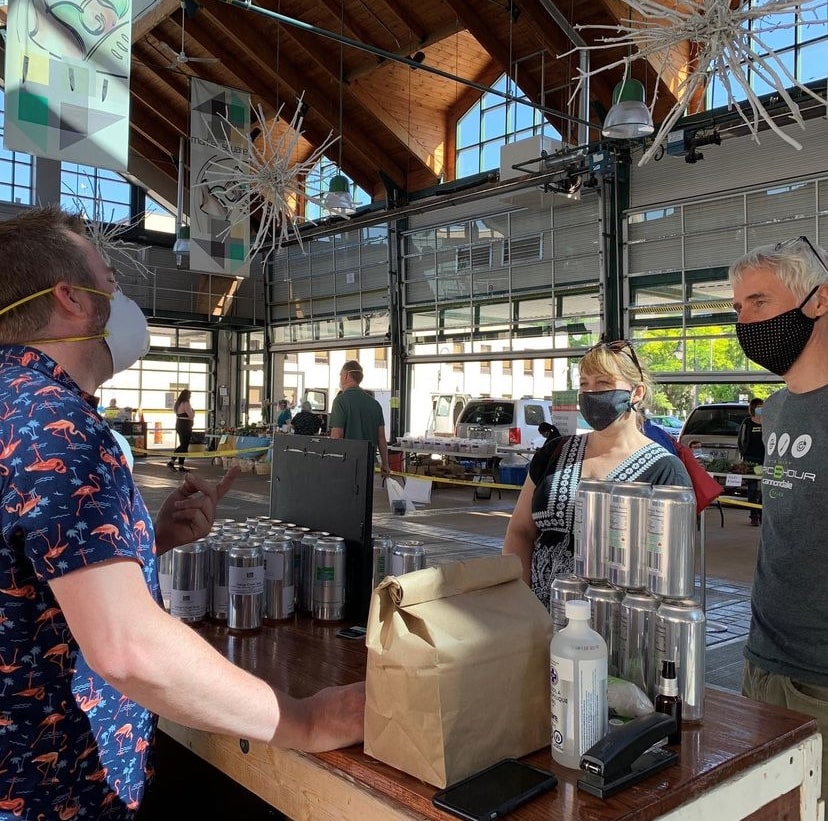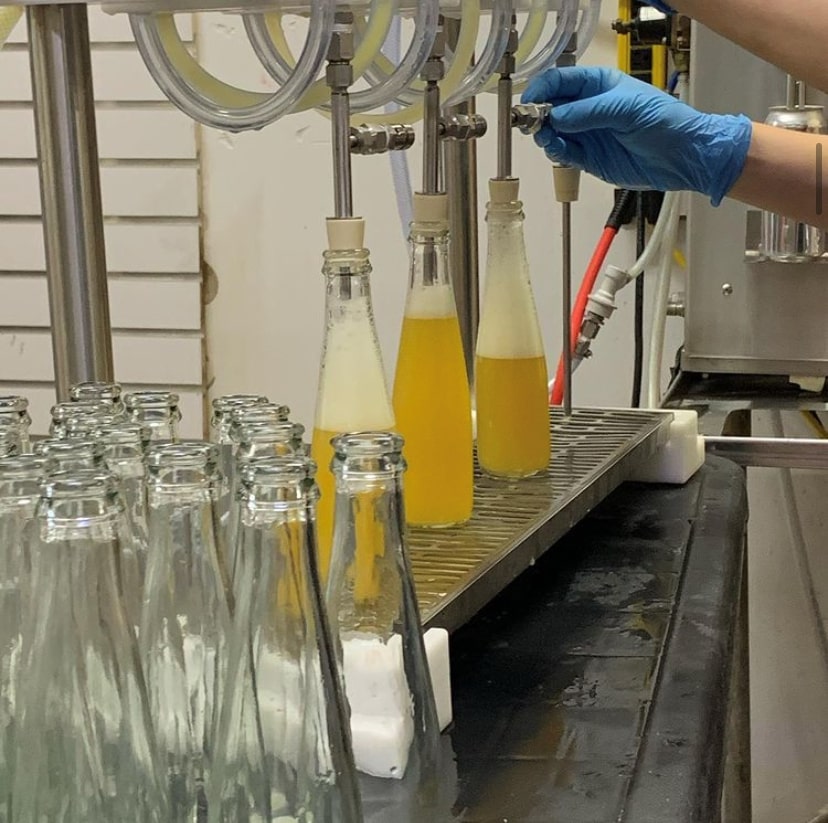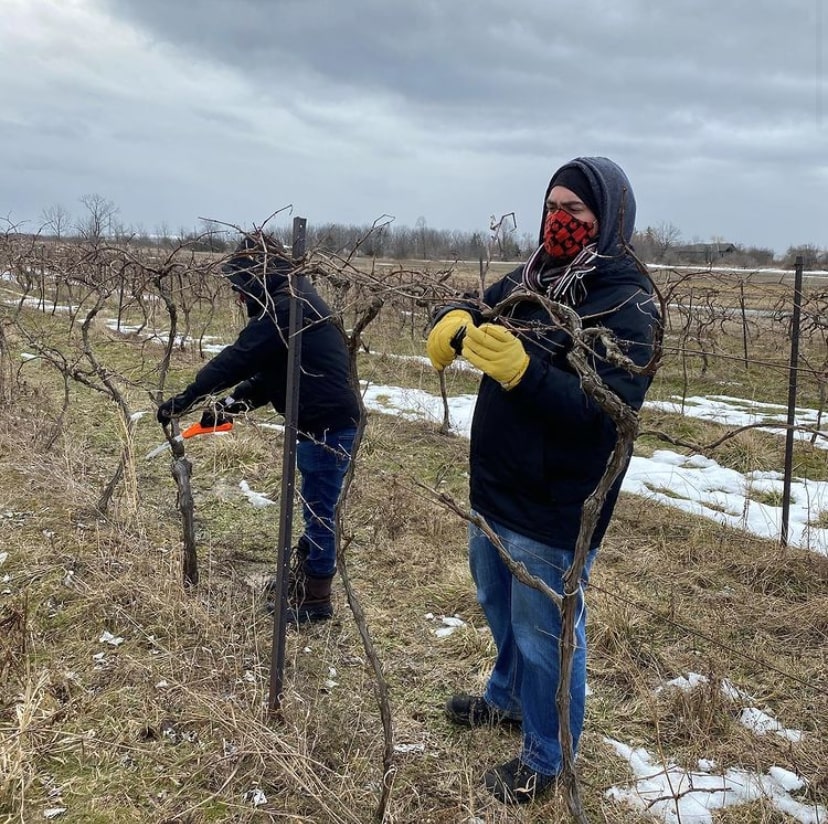By Caleb Szakacs
Sean Polden felt a pit in his stomach as he walked down a gravel driveway that stretched in front of him, leading up to the vineyard on his 78-acre farm.Polden came to a halt at the edge of the property, where he runs his business’ “Soda Shack” out of a wooden stand with soda prices hanging on chalkboard signs.
Standing behind the counter was his primary salesperson, rearranging bottles amongst gusts of wind.
“I’m sorry, but my hands are tied,” Polden said. “I have to let you go.”
This was the first of many layoffs, as Polden could no longer afford wages when the COVID-19 pandemic shut down his sales channels throughout the summer.
Polden, along with several business owners in Niagara, would need timely relief from the government when the pandemic struck. However, these businesses would not meet the requirements, resulting in an uphill battle.
“Starting any business or venture is going to have risks associated with it, but when you throw a friggin’ pandemic in there, it’s going to make the risk exceptional,” says Polden.
The 42-year-old owns Canalside Soda on 324 Thirty Rd. in Grimsby, Ont., where he sells fizzy sodas at restaurants, markets, and the “Soda Shack”.
10 months before the first layoff, Polden would try to sell beverages he spent three years concocting.
As the sun rose on Dec. 9, 2019, Polden drove to the St. Catharines Farmers Market with 80 litres of soda and a handcrafted serving cart on wheels.
Polden arrived with a smile on his face, giddy that finally, he got to sell the drinks he worked so hard to perfect.
After speaking with farmers and locals for hours, Polden pocketed $230.
“By January that number became $1,000, so it was just really exciting to see it grow,” says Polden.
When COVID-19 first hit Ontario and Canalside Soda began experiencing losses, Venture Niagara, a not-for-profit agency that distributes federal funding to small businesses, came to their rescue.
Through the Regional Relief and Recovery Fund, managed by the Federal Economic Agency for Southern Ontario, Venture Niagara granted Canalside Soda $40,000.
According to Venture Niagara’s press release, they provided $3.5 million to 97 businesses to cover operating costs. The fund was made available to businesses that had not received federal relief.
The loan would not solve Polden’s problems, as COVID-19 cases kept rising, shutting down restaurants and markets.
By late August, Polden realized he would not have enough revenue to pay January 2021 wages.
So, Polden went online to collect the Canada Emergency Wage Subsidy, a federal subsidy made available to employers who experienced a drop in revenue. However, Polden did not meet one requirement – create a payroll account by March 15, 2020. Polden had not done so until June.
“Where do they draw the line?” asked Polden. “If it was a line in the sand with the amount of hours the employees worked, then it would at least recognize the investment you put in.”
As lockdowns continued into November, Polden had to fire three employees.

Polden (left), 42, talks to customers at the St. Catharines Farmers Market. Polden spends the day at the market on Jun. 6, 2020, selling soda, a few weeks removed from starting the business. (Instagram via @canalsidesoda) 
A Canalside Soda employee fills up glass bottles with soda in their production facility in Grimsby, Ont. Canalside Soda ordered single-serve glass bottles in July 2020 so customers could buy them at farmers markets. (Instagram via @canalsidesoda) 
Canalside Soda employees serve customers at their “Soda Shack” on their farm in Grimbsy, Ont. Canalside Soda invited local vendors to sell alongside them on the farm property in November 2020 to help provide revenue streams during the COVID-19 pandemic. (Instagram via @canalsidesoda) 
Canalside Soda sets up a table with their beverages at the Pen Centre in St. Catharines, Ont. Canalside Soda sold its beverages at the mall in December 2020, shortly before shutting down its operations. (Instagram via @canalsidesoda) 
Two Canalside Soda employees prune grapevines at the farm in Grimbsy, Ont. Canalside Soda began production for their fall soda flavours in March 2020, after being shut down for over a month. (Instagram via @canalsidesoda)
St. Catharines Coun. Carlos Garcia says several local businesses have struggled to access government relief.
In early 2020, The Twisted Pig, an Italian restaurant, which had to shut down twice, could not access the Ontario Small Business Support Grant, which provided up to $40,000 for businesses who had to close or restrict their services.
The restaurant needed to show its revenue from April 2019, but they had not started their operations until 2020.
“I tried to support them by ordering takeout on Fridays and I saw it became just the husband, the wife, and one chef, so they probably lost more than half of their staff,” says Garcia.
Additionally, Garcia is a board member of the FirstOntario Performing Arts Centre and says the organization has failed to access most government relief because they are not a charitable organization or a not-for-profit organization.
The PAC hosts events for different entertainers to perform at throughout the year.
“They have an application to get incorporated as a non-for-profit and that will help with qualifying, but in the meantime, they haven’t qualified for hardly anything other than grants, which is what they have always qualified for,” says Garcia.
Because the PAC had accessed little relief, they have had less than a handful of events in their venue since the beginning of the pandemic.
Unlike the arts centre, Canalside Soda would receive a glimmer of hope.
This hope came in the form of an email on Nov. 15 from the Outlet Collection at Niagara, who invited Polden to sell his products at their outdoor mall for three weekends.
It was an early afternoon, around 72 hours before the first sales day, where Polden and three employees were capping bottles in the production facility.
Hearing his phone ding, Polden grabbed his phone from the front pocket of his jeans. After turning it on, he saw an email from the mall.
Prepared for good news, Polden would be crushed by the email.
The mall stated their environment was no longer safe for them to sell their products.
Polden shut his phone off and shoved it back into his pocket.
Without relief and now missing out on around $15,000, he knew he could not afford his staff’s wages.
Later that day, he gave his employees a two-week layoff notice. Beginning on Dec. 18, Polden would shut down operations for over one month.
“My employees would have preferred to continue working these last few months, and I think that’s where the problem with the funding is and where it would have been more beneficial,” says Polden.
During this time, Polden was persistently reaching out for support.
“I have consistently advocated to my federal and provincial representatives for an expanded wage subsidy,” says Polden. “Ultimately policy change is driven by stories of actual lived experiences. But we are still not there yet.”
Polden is optimistic for growth this summer because of the “buy local” movement gaining traction, where corporations provide benefits to customers who support local businesses. For example, RBC’s Canada United campaign offers points on customers’ rewards cards for shopping locally.
A month removed from their shutdown, Canalside Soda employees began pruning grape vines for their staple flavours, and Polden is hopeful he can grow his staff to 30.
“I’m a rarity in terms of growth through the pandemic,” says Polden. “But that’s irregular…My concern is the longer-term impacts of economic recovery that we are going to see for these small businesses.”
